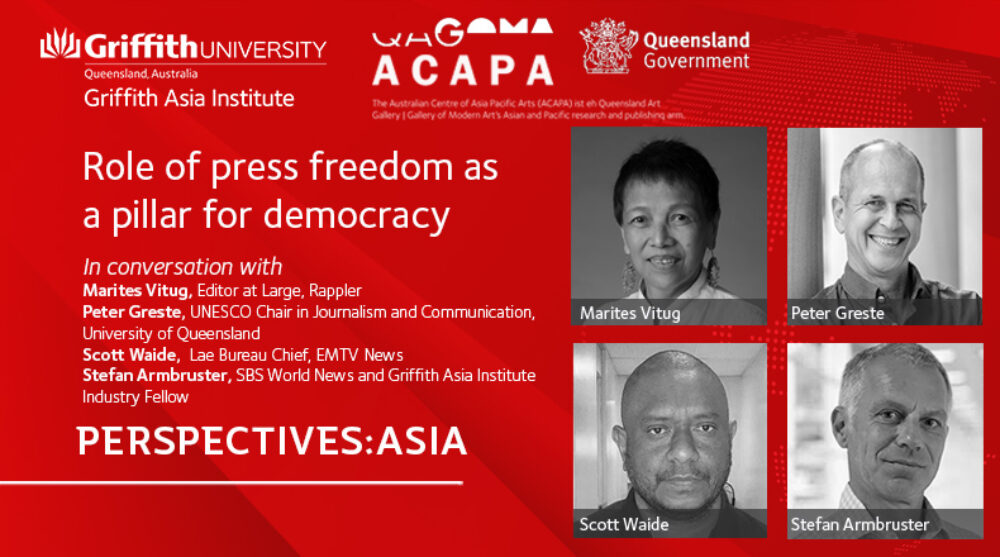Three distinguished journalists from the Asia-Pacific region – Philippines, Papua New Guinea and Australia – discussed the “Role of press freedom as a pillar of democracy” at a recent Griffith Asia Institute (GAI) Perspectives Asia webinar.
These brave and respected champions of press freedom engaged in a forthright discussion on efforts to shut down the media and the right to speak truth to power. They confirmed recent reports by Reporters Without Borders (RSF), International Federation of Journalists (IFJ), Transparency International PNG and other NGOs warning of mounting violations in the Asia-Pacific region.
Panelist Marites Vitug, the editor-at-large of Rappler newsite in the Philippines highlighted a continuing campaign of law fare against journalists and media in her country. She said since President Duterte came to power in 2016 he has targeted journalists and demonised journalism.
“Duterte is (now) using the COVID-19 pandemic to push harder and restrict freedoms, our Congress has passed an anti-terror law and the definition is so broad it can even include critical media,” Ms Vitug explained.
Since our discussion, Rappler has again been before court this time over alleged tax evasion. Ms Vitug says there is one hope for her country.
“We have presidential elections in 2022, we need a change of leader, one who will abide by our democratic values.”
Panelist Peter Greste is the co-founder of the Alliance for Journalists’ Freedom. He was a foreign correspondent for 25 years who was imprisoned in Egypt on terrorism charges. Mr Greste says there is a similar pattern in Australia with more than 80 separate national security laws passed since 2001 and the “war on terror”.
“Australia leads the world in national security legislation, which is actually undermining national security, with a shift from physical conflicts to a conflict over ideas, which gives governments a licence to silence those avenues of ideas,” Mr Greste commented.
His warning comes as another law is before Australia’s parliament and after last year’s federal police raids on journalists and media.
“There are a whole range of screws being tightened to reduce journalists’ capacity to do their work, the laws are being weaponised to come after journalists,” Mr Greste said.
Concerns about media freedom keep mounting in Papua New Guinea said panelist Scott Waide, investigative journalist at broadcaster EMTV, despite the introduction of legislation for a human rights commission and whistleblower protection.
“The situation has deteriorated significantly over the last 10 years,“ he said
“We don’t get as many opportunities to challenge the prime minister, and they [politicians] make themselves so inaccessible, they virtually just stop to talking to anyone.”
“There is a lot of scepticism that the laws will be implemented.”
But all three panelists saw hope in solidarity between journalists, media organisations and with the public.
“We need to get conversations going (across the region) so we can get a more united stand to help each other, learn from each other,” said Ms Vitug.
All pointed to the role social media can play in supporting media freedom when it is under attack.
“We’ve had support in-country on social media but an even greater army of support from overseas mobilising. When you see support like that, it strengthens your resolve and makes you realise why you do the job,” Mr Waide said.
And there was a clarion call to secure the role of media scrutiny as a vital component in democracy and underwrite national security for all.
“We need to fundamentally rethink the role of the media in a democracy and radically rethink how it should work to hold governments to account, to perform its democratic role because if we lose that element, then we are at danger of causing fundamental violence to the democratic system, which has worked so well for so long,” said Mr Greste.
Watch the webinar
Listen to the podcast
AUTHOR
Stefan Armbruster is Queensland and the Pacific correspondent for SBS World News. He is an Industry Fellow at the Griffith Asia Institute.
Perspectives:Asia is a program of public seminars designed and promoted by the Griffith Asia Institute, Griffith University and the Australian Centre for Asia-Pacific Art (ACAPA), Queensland Art Gallery | Gallery of Modern Art to explore issues of contemporary culture, politics and society in our region, while fostering public discussion of Australia’s relations with its region.








